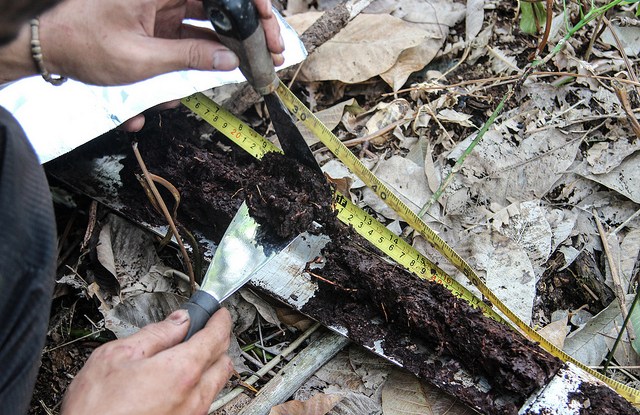
Author: Maddion-Harris, H. | November 2, 2018 | Best Practice
Representatives of Indonesia, the Republic of Congo and the Democratic Republic of Congo (DRC) joined with international organizations to push forward a sustainable peatland agenda at a launch event for the new International Tropical Peatland Center (ITPC) in Jakarta on Tuesday.
The three countries – all home to extensive areas of tropical peatland – comprise the founding member states of the center, which is expected to become a holistic platform for peatland science and practice. It marks the first time countries from the global south have banded together in such a way to protect these pivotal yet under appreciated ecosystems. When managed sustainably, tropical peatlands offer not only substantial environmental gains, but also potential livelihood benefits to those living on and around them.
During the event, Indonesia’s Environment and Forestry Minister Siti Nurbaya Bakar, the Republic of Congo’s Tourism and Environment Minister Arlette Soudan-Nonault and the Director General of Forest Resources for DRC’s Ministry of Environment and Sustainable Development, Jose Ilanga Lofonga, launched an interim secretariat ahead of the formation of the center itself within one year.
CLIMATE CHANGE FIGHT
Peatlands, natural areas of the accumulated decayed plant material known as peat, have huge importance as carbon sinks, and are believed to hold 30 to 40 percent of global carbon despite covering only 3 percent of the world’s land area – making them key in limiting global warming.
“If we cannot conserve peatlands, there is no way we can win […] against climate change,” said Erik Solheim, head of UN Environment.
Doing so would require making an economic case as well as the environmental case for peatlands, he said, suggesting tourism and improved agriculture as possible avenues of economic promise. Effectively protecting peatlands would represent a “triple win” for humanity, he explained – benefiting people and their health, the environment, and the economy.
The Center for International Forestry Research’s (CIFOR) Director General Robert Nasi also highlighted the importance of bringing economics into peatland preservation and restoration, stating: “We have absolutely to conserve the peatlands that have been so far preserved […] because it is much more costly to restore than to conserve.”
The private sector could be involved in restoration, he continued, while restoration could also be transformed into an activity that created jobs and improved livelihoods.
LEARNING FROM THE PAST
Indonesia has enjoyed international recognition of its efforts in recent years to implement sustainable peatland management. The country’s experience in managing its over 15 million hectares of peatlands, according to Minister Siti, began early last century, when local tribes such as those in Kalimantan managed peatlands in a sustainable manner.
Following that was a period of extensive peatland utilization beginning in the 1970s, which saw timber plantations, large-scale agriculture and draining that degraded significant areas.
The present period was a “corrective era,” Minister Siti said. Since severe fires and haze in 2015, the country has enacted a peatland restoration agency, strengthened a moratorium on new licenses, improved primary forest, and overseen strict enforcement of policies. It is now also instrumental in the establishment of the ITPC.
According to Dianna Kopansky of the Global Peatlands Initiative, the history of draining the typically waterlogged peat has left the country with the current “harsh reality” of having to invest intensively to rewet and restore peatland.
Conversely, there has been no drainage of peatland areas in the Congo Basin, said the University of Leeds’ Simon Lewis, who led a team that for the very first time.
“These peatlands are incredibly valuable – locally for livelihoods, regionally for rainfall, and globally in terms of climate impacts,” he explained, before posing the questions of how the Congo Basin can manage its newly discovered peatland without experiencing the issues seen in Indonesia, and how development can be carried out in the region without the environmental destruction seen in other parts of the world.
SOUTH-SOUTH COOPERATION
Throughout the day’s discussions, several speakers from government, international organizations and research institutions – including the ITPC’s coordinating partners the Indonesian Environment and Forestry Ministry, CIFOR, UN Environment and the U.N. Food and Agriculture Organization – covered the importance of international collaboration and mutual learning, particularly between countries in the global South.
Speakers also raised collaboration and capacity strengthening at all levels, as well as community engagement and alternative livelihoods among people currently living on peatland. Growing betel nut and paddy, collecting medicinal plants, fishing and hunting were mentioned as possibilities on peatland across the three countries.
With land management previously viewed by some as a largely national issue, peatlands have now taken their place on the world stage. In the context of its corrective era, Indonesia, for example, is “keen to share our experience so that fellow countries do not have to reinvent the wheel,” said Minister Siti, citing a positive response from the international community to the formation of the ITPC.
“Tropical peatlands are found in more than 80 countries, yet they remain among the least understood and monitored ecosystems in the world,” she added, describing them as a key component for mitigating the effects of climate change.
With the center set to become an information hub, built on both international and cross-sectoral collaboration, speakers concurred that it would enable countries to make more informed decisions about their tropical peatlands, leading to global benefits in light of climate targets.
Article link: https://forestsnews.cifor.org/58437/new-peatland-protection-center-in-indonesia-represents-triple-win-for-humanity?fnl=en
